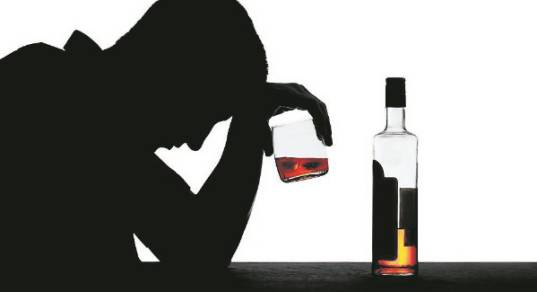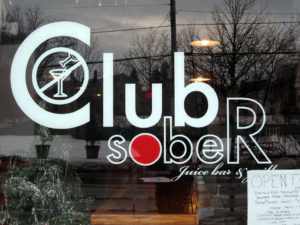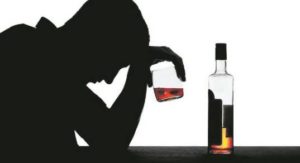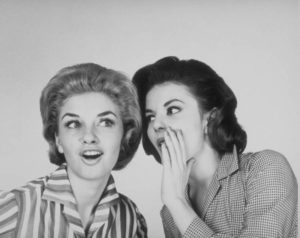
Someone else’s problem

Resist I do, however, albeit under severe duress. Because being a teetotaller in Ireland is incredibly difficult. I’m not asking for sympathy, or even congratulations, I’m just stating facts; to be sans-pint in this country, is to be an oddity, a strange arid entity in a lush land.
Ashamed of my otherness, I adopt an apologetic approach, fielding questions with vague, unspecific replies, alluding to a murky past, one best not recalled. If pressed however, I bring out the big guns, the anecdotes, the tales that will tie me to my tipsy inquisitors, gain their trust and get them off my back.
I regale them with stories of when I did drink, hilarious escapades which characterised my days of decadence. Immediately their demeanour changes, they relax, that air of suspicion recedes, they see me as one of them, a man who knows how to enjoy himself but, for reasons unknown, has bowed out of the game early.
This is the extent to which alcohol defines us, to which it continues to define me, long after I last took a sup. I may be a grown man, a relatively sane, adequately intelligent thirty-something, but place me in a pub environment, ask me to go to the bar to order a mineral, and I become sheepish, subjugated, afraid to look the barman in the eye lest he ‘out’ me, praying he assumes I’m the night’s designated driver.
And then, as I return to my friends, dainty glass in tow, I pray further, pray that onlookers mistake my Ballygowan for something more poisonous, a triple-vodka, a trendy new gin, anything but the insipid substance contained therein.
It’s possible that I’m being unnecessarily neurotic, projecting my insecurities onto an uncaring public, but I’m just a product of my environment; an environment where the abuse of alcohol is normalised, where binge-drinking and excessive consumption are encouraged by one’s peers, and where three out of every five people have a heavy drinker in their life.

That those in low income households are most at risk from the effects of alcohol comes as no surprise. I grew up in a household of that ilk, a setting where the most idyllic of evenings, or afternoons, could turn sour with the turn of the key in the door, where ill-tempered drunkenness, and all that came with it, was part of our everyday existence. Indeed, it’s been like this for thousands of Irish families, regardless of their income, for many years; taciturn men, and sometimes women, seeking solace in the bottle, not finding it, and then seeking vengeance on those who least deserve it.
This is who we are, who we’ve always been, a strange, complex race, a maudlin set of inebriates with a deep fear of the Lord Almighty.
But things are different now, right? We’ve shaken off the shackles of the past, we’ve become liberated, opened up, exposed ourselves to anyone willing to take a look. You can’t move for people telling you how depressed they are nowadays, how addicted they are to drugs, to gambling, to sex, to booze. This great nation of weak, silent types has opened its big fat gob and a whole raft of uncomfortable, unsavoury truths has spewed forth. It’s been cathartic, cleansing.
And we’re not done yet. By the time we finish, there’ll be nothing left unsaid, no taboos, no unmentionables, the happy Irish, all talked out, at one with themselves and the world around them.

That may be the case, but making it a little bit more expensive, hiding it in secreted vaults, won’t change centuries of indoctrination. Changing its price, its location in the shop, is merely sticking a plaster over the wound.
If we are ever to rid ourselves of this disease, we need to change our mindset. We need to treat this dangerous substance with the respect it deserves. More than that, we need to ask ourselves why so many of us abuse alcohol, why it has such a hold over so many of us, and why it continues to destroy the lives not just of those who partake, but the lives of their loved ones too.
For me, it’s a case of recognising what abuse is, and reframing what it is to be an alcoholic. If you drink every day of the week, even if it’s just a few pints after work, a bottle of wine in the evening, then you have a problem. You may dismiss that claim as being overly-dramatic, almost hysterical, but deep down you know I’m right. If you drink to excess, as in falling down drunk, waking up with no recollection of how you got home, more than three nights a week, then you have a problem too.
In most other countries that kind of behaviour would instantly be highlighted as problematic. Friends, family members would rally round, offer their help and support, suggest ways to combat the issue. Here, we just shrug our shoulders, laugh it off and pour ourselves another. To do otherwise, to actually call someone out on their drinking, would be treason, the act of a killjoy. And this attitude transcends generations, both young and old forever reluctant to look one another in the eye and ask, “have you enough for one night?”
It’s far too late to save my generation, or even the one coming behind me, but the children of today, the little scrappers who have probably already witnessed what it is to be Irish and drunk, they still stand a chance, they needn’t grow up in a world where to be sober on a Saturday night is to be the strangest man in town.
Battle of the sexiest

It’s all part of a covert competition, she said, one carried out right beneath our noses without us even knowing about it. Apparently when they get dressed up they do so not to lure prospective partners, but to show other women how much better they are than them.
Is this true? I don’t know. But research carried out by scientists at Florida State University suggests that it might be. They discovered that women were more likely to spread gossip about attractive girls. By dressing up a female member of their team in two contrasting outfits, one which accentuated her assets, the other which didn’t, and asking her to recount a fabricated sexual encounter to unwitting subjects, the researchers sought to discover whether the woman’s appearance affected the retelling of the story.
Lo and behold, it did, the women proving far more likely to share the sordid details if the lady telling it was provocatively dressed. However, it’s not all bad, because, according to the boffins, some of the women shared the story out of concern rather than malice. “A lot of them honestly just seemed worried about her,” said Dr Reynolds, before adding, “probably spreading this is not helping that woman in the slightest though.”
So, in other words, women can be bitchy without even realising it, their ingrained competitiveness compelling them to discredit one another even when they’re trying to help a sister out.
Meanwhile, us chaps go about our day in blissful ignorance, foolishly believing that our presence on this earth, our lumbering awkwardness, makes a slight bit of difference to an ongoing war that we’ll never be part of.









